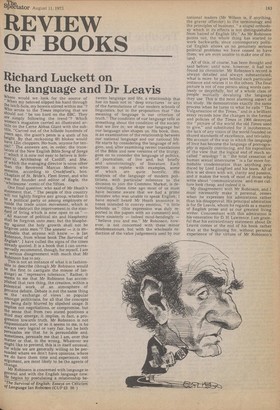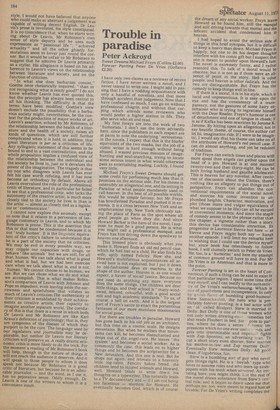Richard Luckett on the language and Dr Leavis
Where would we look for the source of " When my beloved slipped his hand through the latch-hole, my bowels stirred within me "? Who wrote to the Times imploring that we Should not 'be too hard on the BBC. They are simply following the trend '"? Which women's magazine carried an illustrated article on the Cerne Abbas Giant with the sub title, "Carved out of the hillside hundreds of Years ago, the giant's penis is a sixth of his height. By that reckoning 6ft blokes would have 12in choppers. Ho-hum, anyone for ten nis?" The answers are, in order; the translators of the New English Bible Song of Songs
("which it is now not easy to believe is Solornun's); Archbishop of Cardiff; and She, a which the managing director is none other than the Reverend Marcus Morris who remains, according to Crochford's, hon. Chaplain of St. Bride's, Fleet Street, and who was the founder and editor of Eagle, the Wholesome 'comic of the 'fifties.
One final question: who said of Mr Heath's statement that, The people of this country not lightly forgive any group, whether it oe a political party or among employers or inside the trade union movement, which is seen to obstruct the improvement in the standard of living which is now open to us" — " All manner of political sin and blasphemy Shall be forgiven unto men: but the blaspheMY against the holy growth shall not be forgiven unto men "? The answer — it is improbable that anyone will know — is Ian Robinson, from whose book The Survival of English*. I have culled the signs of the times already quoted. It is a book that I can unreaservedly recommend, though, for myself, I am Iii serious disagreement with much that Mr Robinson has to say.
This is not an instance of what it is fashionable to describe (though ,Mr Robinson would be the first to castigate the misuse of language) as "repressive tolerance." Rather, it seems to me that Mr Robinson has accomWished that rare thing, the creation, within a Polemical work, of an atmosphere of genuine debate. Debate is not the same thing as the 'exchange of views' so popular amongst politicians, for all that the concepts a, re being daily blurred by slipshod usage. It Miplies not negotiations, or compromise, but the sense that from two stated positions a third may emerge; it implies, in fact, a progression towards truth. Mr Robinson is not dispassionate nor, or so it seems to me, is he always very logical or very fair, but he both
Persuades me that he is persuadable and, sometimes, persuade me that I am, over this Matter or that, in the wrong. Whatever we Might like to pretend, this is in itself unusual, for while we are generally willing to be per suaded where we don't have opinions, where We do have them time and experience, not argument, are most likely to be the agents of Change. Mr Robinson is concerned with language in general and with the English language now. He begins by postulating a relationship be The Survival of English: Essays on Criticism Of Language Ian Robinson (CUP O. 50 ) tween language and life, a relationship that has its basis not in 'deep structures ' or any of the formulations of our modern schools of linguistics, but in the proposition that "the meaning of language is our criterion of truth." The condition of' our language tells us something about the condition of the society that we live in; we shape our language but our language also shapes us. His book, then, is an examination of the relationship between our national language and our national life. He starts by considering the language of religion, and, after examining recent translations of the Bible and new versions of the liturgy, goes on to consider the language of politics, of journalism, of live and, but briefly and unconvincingly, of literature. Each section is replete with examples, some of which are quite horrific. His analysis of the language of modern politicians, with particular reference to the decision to join the Common Market, is devastating. Some time ago most of us must have become aware that we had a prime minister who was unable to speak English; I have myself heard Mr Heath announce in tones intended to convey emotion, "it little beholds us " (this expression was duly reported in the papers with no comment) and, more sinisterly — indeed mind-bendingly — "believe you and me." Mr Robinson, however, is not concerned with these minor misdemeanours, but with the wholesale reduction of the value judgements used by our national leaders (Mr Wilson is, if anything, the graver offender) to the terminology and the principles of business, "a stupid orthodoxy which in its effects is not distinguishable from hatred of English life." As Mr Robinson points out, the whole thing has started to work backwards; since contemporary political English allows us no genuinely serious political problems we have ceased to have them; we are even unable to make one of Ireland.
All of this, of course, has been thought and said before; until now, however, it had not found its chronicler. Mr Robinson's record is always detailed and always substantiated; what is more, he goes behind each particular instance and relates it to the others. The final picture is not of one person using words carelessly or deceitfully, but of a whole class of people mutually devaluing the language they use. This is the most alarming aspect of his study. He demonstrates exactly the same process when he turns to what he calls "The Vulgarisation of the Times," and in a brilliant essay records how the changes in the format and policies of the Times in 1966 destroyed the "picture of the world the old Times used to give," and substituted for it incoherence, the lack of any vision of the world founded on shared standards of excellence, and triviality. His account of the way in which the language of love has become the language of pornography is equally convincing, and his exposition of the view that the logical end of much socalled "sexology " is "the total cessation of human sexual intercourse " is a far more formidable condemnation than anything produced by Lord Longford and his team. All of this is set down with wit, clarity and passion, and it makes the work of most of those who write about 'communications 'and mass culture look cheap, and indeed it is.
My disagreement with Mr Robinson, and I must necessarily make it personal, comes when he expresses his admirations rather than his disapproval. His principal admiration is for Dr Leavis, whom he regards as a master of English prose and as our greatest living writer. Concomitant with this admiration is his veneration for D. H. Lawrence. I am grateful that his extraordinary statement about Dr Leavis comes at the end of his book rather than at the beginning for, without personal experience of the virtues of Mr Robinson's
style, I would not have believed that anyone who could make so aberrant a judgement was capable of writing decent English. Dr Leavis's prose is involuted, his style constipated. It is no coincidence that, when he starts writing about Dr Leavis, Mr Robinson's own sense of style departs and he uses such expressions as "passional life "; "achieved actuality" and all the other ghastly formulations seem to hover just round the corn ner. But it would be unfair to Mr Robinson to suggest that he admires Dr Leavis primarily as a stylist. His allegiance is based on his adherence to Leavis's views on the relationship between literature and society, and on the function of criticism.
"In what else does barbarism consist," Goethe once rhetorically inquired, than in not recognising what is really good?" I do not know whether Leavis has ever quoted this, but the principle has always been central to all his thinking. The difficulty is that the terms have been modified; Goethe's view doesn't exclude the possibility that a barbarous society might, nevertheless, be the context for the production of major works of art. Leavis's assertion, echoed by Mr Robinson, of the relationship between the health of a literature and the health of a society, raises all kinds of questions, which are still further complicated when it is held, in addition, that great literature is per se a criticism of life. Any syllogistic statement of this seems to be bound to end in a vast contradiction, and the whole proposition implies a confused view of the relationship between the individual and the society he lives in, just as it devalues the power of the imagination. The tragedy is that no one who disagrees with Leavis has ever felt his case worth refuting, and it has now become an orthodoxy by default. Above all Leavis overvalued the role of the professional critic of literature, and in particular he failed to see that a professional critic, who lacks the autonomy of the creative artist, is much more closely tied to the society he lives in than is the artist — almost as closely tied as a legislator or communicator.'
I cannot now explore this anomaly, except to note that it relates to a perversion of language customary in Leavis, and to which Mr Robinson is prone. This is the assertion that this or that must be condemned because it is not 'truly human'. It is the linguistic equivalent of the critic's failure to understand that he is a part of the society that he criticises. We may be evil in every possible way, we may cripple our capacities with drugs, or behave like animals' but we are still, for all that, human. We can talk about what is good and what is bad, but we had best exercise care when we talk about what is, and is not, 'human.' We cannot choose to be human; we are. But we can chose what we do and what we accomplish. This is what makes Robinson's comparison of Leavis with Johnson and Pope so impudent, even leaving aside the narrowness and spitefulness that vitiates so much of Leavis's criticism.The authenticity 3f their criticism is established by their achievements as creative artists, their capacity to imagine another separate world. The corollary of this is that there is a sense in which both, Dr Leavis and Mr Robinson are like Karl Kraus's definition of psychology; that is, they are symptoms of the disease of which they purport to be the cure. The language used by our legislators and journalists may be deplorable, but neither Dr Leavis nor literary criticism will preserve us. A really drastic economic crisis is more likely to do the trick. For the moment a reading of Mr Robinson's book will help, though in the nature of things it will not reach the audience it deserves. And it will speak to those people to whom it does speak not because Mr Robinson is a good critic of literature, but because he is an admirable journalist — and the word, as I use it, has no pejorative sense. Oddly enough, Dr Leavis is one of the writers to whom it is a convenient insult.



































 Previous page
Previous page